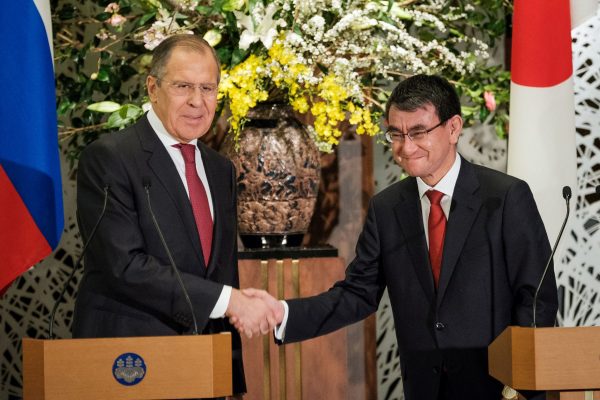The United States insists that it is deploying these air defence systems in response to North Korea’s ongoing missile tests. But the Russian Federation strongly opposes both of these developments. Russian officials have asserted that THAAD’s deployment in South Korea could spark a regional arms race and prompt Russia to leave the Strategic Arms Reduction Treaty (New START) — a treaty signed by the Obama and Medvedev administrations in 2010 that aimed to halve the number of Russian and US strategic nuclear missile launchers.
The Russian government has declared that Japan’s installation of the Aegis Ashore system would constitute a violation of the Intermediate-Range Nuclear Forces Treaty), which eliminated all nuclear and conventional missiles with ranges between 500 and 1000 kilometres.
While singularly directing its frustration at the United States, Moscow has taken different approaches to Seoul and Tokyo in light of their decision to procure US missile defence systems. The Kremlin has expressed a bleak outlook on future Japan–Russia relations in light of Tokyo’s decision to deploy Aegis Ashore. THAAD, however, has not prevented Russia from pursuing an increased rapprochement with South Korea on a variety of fronts.
The divergence in Russia’s approaches to Japan and South Korea is notable given that they are both US allies that are cooperating with Washington and working against Russia’s security interests.
Outside the context of missile defence, Seoul and Tokyo have occasionally taken differing stances in their respective relations with Russia. Japan imposed sanctions on Moscow following Russia’s annexation of Crimea in 2014, while South Korea abstained from doing so.
Divergent policies on a specific issue like sanctions do not sufficiently explain why Russia would react differently towards Japan and South Korea for allowing the United States to deploy these missile systems. Regional geopolitics, however, may shed some light on the reason for the differing tracks in Moscow’s relationships with Seoul and Tokyo in the context of missile defence.
In December 2017 Russian Foreign Ministry spokesperson Maria Zakharova slammed Tokyo’s decision to allow the United States to deploy its Aegis Ashore system in Japan, calling it an impediment to the development of bilateral relations based on mutual trust.
Japanese Prime Minister Shinzo Abe and Russian President Vladimir Putin have placed particular emphasis on their desire to resolve the Kuril Islands dispute. Despite continued high-level discussions, their attempts to reach an agreement over the islands seem to be deadlocked. Unquestioned ownership of the islands is crucial for Russia’s ability to project influence in the Asia Pacific.
The ongoing territorial disagreement has perpetuated lingering strategic distrust between Japan and Russia. This may explain in part why Russia tends to view its relationship with Japan through the lens of the Tokyo–Washington alliance. Japan’s willingness to support US-led security initiatives that run counter to Russian interests aggravates relations between Moscow and Tokyo.
In contrast, Russia has not let THAAD sour the South Korea–Russia strategic partnership. Moscow and Seoul continue to experience a growing economic rapprochement under the auspices of Moon Jae-in’s ‘New Northern Policy’. They have also experienced an uptick in cooperation over resolving the North Korean security crisis.
This has certainly been possible in part because Moscow and Seoul have no geopolitical disagreements, as well as because of Seoul’s capacity for political independence from the United States compared with Japan.
Moscow has also pursued a policy of equidistance between North and South Korea. A driving factor behind Russia’s balanced relations with Pyongyang and Seoul, aside from the Peninsula’s geopolitical significance, is the hope that Russia can pursue trilateral economic cooperation with the Koreas. The political division of the Korean Peninsula frustrates Russian endeavours towards economic cooperation — particularly in the fields of energy and infrastructure. Ideally, Russia would like to be able to implement projects on the Korean Peninsula to provide Pacific Russia with access to Asian markets via Korean territory.
For Moscow, Japan’s willingness to host Aegis Ashore is another step backwards for a relationship already mired in geopolitical discord. But Russia has much to lose by allowing THAAD to derail Moscow’s pursuit of close working relations with Seoul — its economic gateway to Asia.
Anthony V Rinna is an analyst on Russian foreign policy in East Asia for the Sino-NK research group. He currently resides in South Korea.

